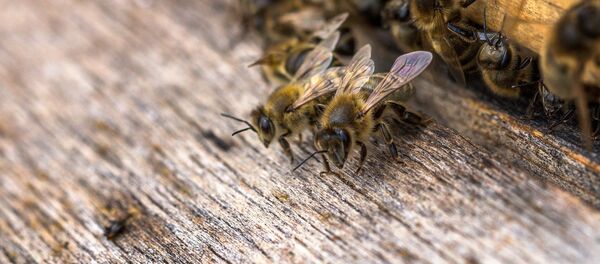In fact, the EPA proposed a ban on chlorpyrifos back in 2015, responding to a petition and lawsuit from the Natural Resources Defense Council and other groups, and the agency's own research confirmed the following year that the pesticide was linked to developmental and neurological disorders, especially in children, The Hill noted.
However, Dow Chemical Co., which sells the pesticide under the brand name Lorsban, objected, as did other agricultural interests, accusing the EPA of "short-circuiting" the science justifying the proposed ban.
Pruitt agreed with that conclusion, saying in March 2017, "We need to provide regulatory certainty to the thousands of American farms that rely on chlorpyrifos, while still protecting human health and the environment… By reversing the previous administration's steps to ban one of the most widely used pesticides in the world, we are returning to using sound science in decision-making — rather than predetermined results." He further cited Department of Agriculture research that contradicted the EPA's findings.
Fred Magdoff, emeritus professor of plant and soil science at the University of Vermont, told Sputnik in December 2017 that the Republican-led attacks on environmental regulations through both the legislature and executive branch "will have ramifications for years, if not decades to come."
"They have literally put the foxes in charge of the henhouses," he told Radio Sputnik's Loud & Clear. Before becoming EPA Administrator, Pruitt served as the Attorney General of Oklahoma, suing the EPA on behalf of various industries in the state over a dozen times before becoming the agency's chief in February 2017.
However, the Court of Appeals for the 9th Circuit found Thursday that by circumventing the ban, the Trump administration violated the Federal Food, Drug and Cosmetic Act, the federal government's pesticide regulation law, which doesn't permit pesticides on food if any harm has been found from exposure to it.
"There was no justification for the EPA's decision in its 2017 order to maintain a tolerance for chlorpyrifos in the face of scientific evidence that its residue on food causes neurodevelopmental damage to children," wrote Judge Jed Rakoff in the 2-1 ruling, The Hill reported. "The time has come to put a stop to this patent evasion."
EPA spokesperson Michael Abboud further indicated the agency was separately reconsidering its previous decision.
Pruitt resigned last month amid a slew of ethics violations allegations, Sputnik reported.
Chlorpyrifos is one of the most widely used insecticides in the United States. It was first developed by the Nazis for chemical warfare but is today used on a wide variety of crops, from fruits and vegetables to cotton, noted Earthjustice, a nonprofit group that litigates environmental issues.
"Residues of the pesticide have been repeatedly documented in baby foods and juices," noted New York Attorney General Barbara D Underwood in a Thursday press release praising the ruling. "The USDA's Pesticide Data Program shows that detection of chlorpyrifos residues is common on many foods. For example, residues were found on over 42 percent of almonds sampled in 2007 and 2008 (the only two years almonds were tested)."
"The pesticide acts by inhibiting an enzyme that is key to the proper development and functioning of the central nervous system and brain," the New York AG said. "Several studies have shown that children born to women exposed to chlorpyrifos during pregnancy had cognitive and motor development delays in the first three years, and structural changes in the brain, lower working memory and IQ scores at age seven, and movement disorders (including arm tremors) by age eleven."
#BREAKING: We just won a major court victory banning the Trump EPA from allowing the extremely toxic pesticide #chlorpyrifos to be used on food.
— NY AG Underwood (@NewYorkStateAG) August 9, 2018
Studies have shown that kids are so harmed by exposure to chlorpyrifos that their brain structure changes and their IQ is impacted.
The court's decision was celebrated by a number of advocates of a ban, from politicians to farm workers' unions.
"Today's decision represents a monumental victory for the health and safety of children and farmworkers — and an unequivocal repudiation of the Trump administration's unjustifiable refusal to ban chlorpyrifos," said Sen. Tom Udall (D-NM). Udall introduced legislation in June 2017 to ban the pesticide, following Pruitt's failure to do so.
"The science on chlorpyrifos is settled: it is a toxic, nerve agent pesticide that damages children's brains and causes serious health issues in workers exposed to the chemical on the job. Scientists and pediatricians tell us there is no level at which the use of chlorpyrifos on food is safe," the senator said.
Last year, I introduced a bill to #BanChlorpyrifos--because the Trump EPA refused to act to protect children & farmworkers. And today, a federal court is telling the EPA that there was “no justification” for rejecting the science and keeping #chlorpyrifos on the market.
— Tom Udall (@SenatorTomUdall) August 9, 2018
"We applaud the court ruling. Chlorpyrifos affects everyone who comes in contact with this toxic chemical; allowing the use of this toxic chemical is not only irresponsible, it is a crime," said Hector Sanchez Barba, executive director of the Labor Council for Latin American Advancement. "Our agricultural fields should be a source of life, not sickness, and we will continue pushing for a safe environment for our farm workers all over the nation."
Erik Nicholson, vice president of the United Farm Workers of America, a labor union representing over 10,000 workers, also praised the ruling. "The EPA has put the women and men who harvest the food we eat every day in harm's way too long by allowing the continued use of this dangerous neurotoxin," he said in a press release. "We commend the court for doing what EPA should have done years ago. The people who feed us deserve a safe and healthy workplace."






